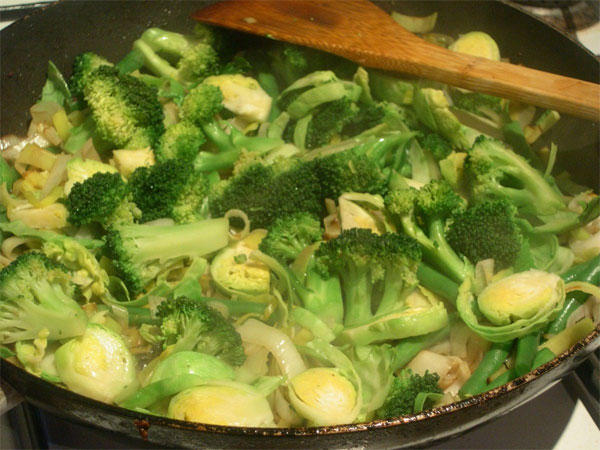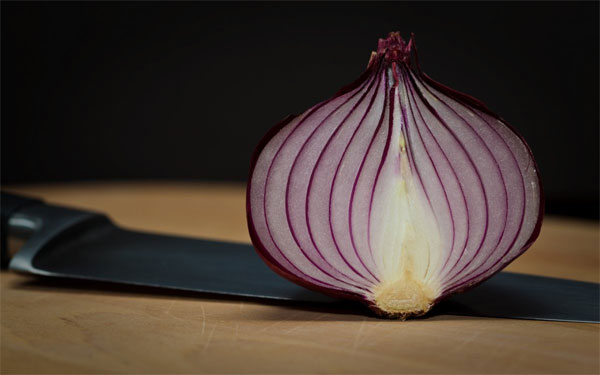3 tips everyone should know when cooking
How to keep bright colors for vegetables, how to avoid tearing eyes when onion and how to identify rotten eggs before processing . are simple tips in daily cooking that not everyone knows .
Here are three basic cooking tips you should know:
How to make vegetables always green when cooking?
Chlorophyll A and B are two molecules that help keep the green color fresh for vegetables. However, when cooking vegetables for a long time, high temperatures can break down plant cells in vegetables and release acid.

Usually these acids are usually stored separately in chlorophyll cells but when exposed to temperature, these acids escape from the cell and come into contact with the molecules. When this exposure occurs, the acids will alter the chemical composition of the chlorophyll molecules. In turn, for a long time, this process will make your vegetables often turn into dark or slightly reddish green.
In order to prevent this process from happening, it is best for the cook to estimate the time within 7 minutes. This is a time that has been calculated and confirmed to be enough to ripen vegetables but not too long for acid to be released. However, this period also depends on some longer ripening vegetables than usual. In addition, some other tips can be applied such as adding salt, ice, cooking oil, lemon and vinegar to vegetable cooking water.
Thai onions and onions are not afraid of spicy eyes
Onions or onions are a vegetable that adds a lot of healthy nutrients and trace elements such as Potassium, Selenium, Vitamin C, . however, because onions are rich in compounds and storage groups. Fluorine such as DMS, DDS, DTS & DT so this vegetable often has a pungent odor that is very uncomfortable for the processor.

When processing and cutting , the cook will face the onion release of a substance called sulfenic acid . When impacted from the side, enzymes in which alliinase is released and impacted with sulfur contain compounds called "Prensco" inside to form sulfenic acid (propenesulfenic-1). The sulfenic acid will then continue to combine with the LFS-synthase enzyme and form a mixture with a chemical name called Thiopropanal S (C 3 H 6 OS) gas, also known as cry gas .
This gas disperses in the air and direct contact with the eye stimulates your sensory neurons to create a feeling of spicy, forcing the gland to work to neutralize and reduce the effects of crying gas.
In order to protect your eyes from the effects of crying gas, the cook just needs to put onions in the refrigerator at least 30 minutes before processing. This tip can greatly reduce the amount of sulfenic acid released. There is also another option such as cutting onions under water, spraying vinegar or turning on fans when operating.
How to distinguish rotten eggs

The smell of rotten eggs (H 2 S) produced during the decomposition of organic matter in eggs will actually be a disaster in the kitchen if you do not know carefully the new eggs.
In order to distinguish whether the eggs you bought are broken or not, one of the simple tips is to put the eggs in a glass of water with a little salt in it. If the egg is cancerous, it will float upwards, which is because H 2 S gas builds up gradually in the affected egg, making it lighter in weight than usual.
If the egg is hovering in the middle, the eggs are old and the eggs sink down to the new eggs. In addition, there is another useful way to look at the eggs in front of the sun, if there is a large space in the head of the egg is a long egg has a high risk of cancer. Or buyers can also shake eggs and if there is no noise is new eggs.
- Introducing some cooking tips
- Great cooking tips that few people know
- 6 healthy cooking oils
- 7 tips for using healthy cooking oil
- Tips to keep fresh fruits after peeling and tending
- How to use the most beneficial cooking oil
- The habit of using oil wrongly can easily lead to liver cancer
- Regular cooking can live longer
- Do you know when seasoning 10 kinds of seasoning in a dish is reasonable?
- Harmful effects of cooking oil on the body
- 4 cooking habits are easy to cause cancer
- 10 good tips to help you save up to 80% gas when cooking
 Soaking vegetables in salt water does not remove chemicals but you should still do it
Soaking vegetables in salt water does not remove chemicals but you should still do it You should limit bamboo shoots if you have 1 in 5 of these diseases
You should limit bamboo shoots if you have 1 in 5 of these diseases Mistakes when soaking vegetables in salt water
Mistakes when soaking vegetables in salt water Risk of death when combining shrimp with vitamin C
Risk of death when combining shrimp with vitamin C